
In anycase, the Grand Portage ended up being not much of a hassle. We did it in one trip and, because of the cooler temperatures, did not even break a sweat. We started the day near Highwater, QC, and paddled about 5 miles upstream on the North Branch of the Mississquoi River to Mansonville. We did about half of the short portage through town and then stopped in the park; Ben went looking for sandwiches, while I settled for cheap and delicious French pastries and a map mounted on the side of gas station. It struck me that the road to Vale Perkins would get us to Lake Memphremagog just the same as the road a bit further north that is the official NFCT route, and we would not have to load and unload the boat again or paddle that extra mile or so upstream. A quick look at the contour lines on the maps settled it, and we set off on what turned out to be a fairly easy portage, considering it was 7 or 8 miles long.

Once we reached the height of land, the landscape opened up and we could see quite a few farms, hills, and, eventually, the lake. Because of this- and because there is actually a pub (one of maybe 3 buildings on the entire route) at the height of land- the portage was not too hard on us, and we made it to Perkins Landing before lunch. In all, we put away about 22 miles today, including a fair bit of upstream and a beast of a portage.
The Missisquoi River since Enosburg Falls has presented us with a variety of challenges. From Richford to the international border, there was not enough water in the river to paddle, and we to line and drag for several miles. From the border station on things settled down a bit and we put away almost 10 miles in the late afternoon. There have been over 100 islands in the river that are not marked on our maps, though this has not impacted our navigation much. My guess is the scale of the maps and the constantly changing river path are the cause, along with the low water. It is interesting to note that while the water on the Saranac was a few feet too high, the water on the Missisquoi seemed a few feet too low.
We've camped in some interesting places this past week, among them Davis Park in Richford, VT. It is just around the corner from the tiny downtown, and features a gazebo, several park benches, and about a hundred foot swatch of flat, green grass between one of the main roads in town and the river. Richford served up one of the best vanilla milkshakes yet, I am happy to report. It is a bit unsettling to me that we can paddle until we cannot move, and then every couple of days check our e-mail and have a milkshake (I've spent about $30 on milkshakes thus far. Go figure.) I am not used to paddling in the front-country, well, the quasi-front country. We've seen quite a few more cows than people lately.
It was in Davis Park in Richford that we realized yesterday morning that we had lost our landing gear- that all important set of wheels that makes portaging on roads so blissfully easy. We had had a hard afternoon the day before and guessed they must be at the end of the last portage 4 or 5 miles back. We decided not to straight-out hitchhike, as our realization of the missing wheels coincided with the arrival of the border patrol. An unmarked black SUV pulled up to the park and a man in a suit came out to question us. He had been informed of suspicious activity in the park.
He left without giving us any trouble, and we headed downtown to look for a ride.
We ended up solicting a ride from a guy named Porky, and I rode with him in his pickup as close to the river as I could get, then waded across, grabbed the wheels, and waded back. Porky was something of a character, to put it lightly, but also one of the nicest people I have met thus far on the trip. He was an older guy, about 50, shirtless and with a bit of a bearded with his long hair pulled back under a Harley-Davidson bandanna. His accent was thick, almost Irish-sounding in that very northern Vermont style, at least to my ear. When I approached him in town, he and his friends we dragging a car out of someone's yard to sell for scrap. Right as I was about to ask for a ride, someone dropped a heavy chain on the car's hood, denting it. They apologized, but Porky laughed, jumped on the hood and dropkicked the windshield in. He then hopped down and we started talking. He owned one of the brick buildings in town, renting the apartments above and running the house of pizza below. He did carpentry work mainly, but picked up scrap when the opportunity presented itself. He did it all, otherwise, he said, "ya'd starve. Not a lot going 'round here."
Porky was a also a fisherman, and a grandfather. He did not charge the old ladies he sometimes did carpentry work for, because he knew they did not have any money. He is a perfect example of a dynamic of the northern forest I have noticed and been told about. Few people can make ends meet with just one source of income, so they do a half dozen different things to keep their families fed. When the heavy industry gone in many of these towns, there is much less captial flowing into them, with the resulting need to follow Porky's example of diversifying one's interest. The connections here are readily apparent as we paddle and see the relics of past industry along our route.
Porky and I also talked about the river. He fished in it often, usually eating the fish he caught. I wondered about this, as I knew we could not drinkt he water beacuse of agricultural run-off. He said the fish were fine, and he also said that when ever he finds a good sized dead fish, he drives it into Burlington to have it tested. "If the fish ain't good, then the water ain't either. Kids swim in there."
The tests and gas cost about $60 each time, and for a man that did not have a huge amount of disposable income, this interested me that he cared enough about the water quality to go to the trouble of getting the fish tested for chemical posioning. Stewardship, whatever its basis or aim, seems to exist in a variety of forms.
Onward and upward to the Clyde River in the AM.
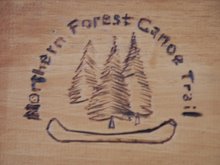
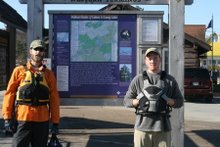
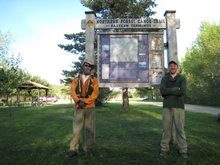
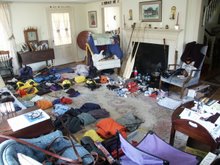
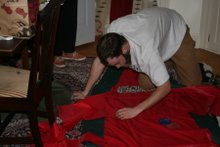
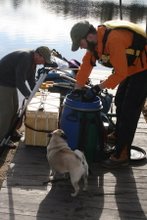
1 comment:
Happy to see you guys are strong at it again. Let us know if there is still an opportunity to meet up somewhere for a night. Cheers to dropkickin' Porky!
Post a Comment